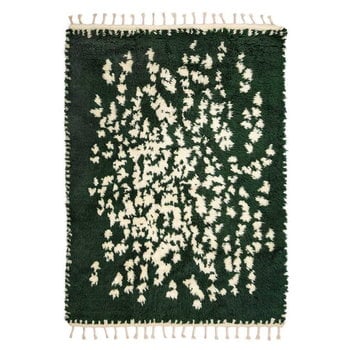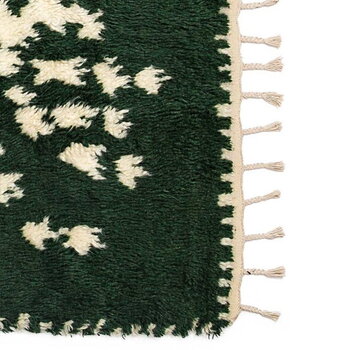The Suovilla rug was designed by Marianne Huotari for the Finnish rug company Finarte. Suovilla is a Finnish word for cottongrass, which covers the vast bog lands of the Finnish Lapland. The rug is hand-knotted from fluffy, semi-worsted New Zealand wool and it also has a touch of Moroccan Berber style. Suovilla is finished with braided ends and it makes a soft and attractive addition to the living room or elsewhere in the house.
Suovilla rug, 140 x 200 cm, green
Finarte
Description
The Suovilla rug was designed by Marianne Huotari for the Finnish rug company Finarte. Suovilla is a Finnish word for cottongrass, which covers the vast bog lands of the Finnish Lapland. The rug is hand-knotted from fluffy, semi-worsted New Zealand wool and it also has a touch of Moroccan Berber style. Suovilla is finished with braided ends and it makes a soft and attractive addition to the living room or elsewhere in the house.
Product details (5)
- Material
- Semi-worsted New Zealand wool
- Colour
- Green, white
- Length
- 200 cm
- Width
- 140 cm
- Notes
- Custom sizes available through our Customer Service (max. 480 x 750 cm).Please note that a semi-worsted wool rug might shed loose fibers when new. The shedding should stop in about three months with normal use and vacuuming the rug.
- Product ID
Designer
Marianne Huotari is a Finnish ceramic and textile artist known for her open-minded approach to combining different materials and forms. Her works reflect her deep respect for natural materials, sustainable design and Finnish traditions – which she interprets in fresh, new ways in her designs. Huotari works as an artist at the Arabia Art Department and as an art director for the Finnish brand Finarte, previously also heading her own brand, STUDIO smoo.
View all productsReviews (1)
1
Based on 1 reviews
-
A
anonyymi
Matto ja maton paketti haisivat jo haettaessa aivan homeelta, minkä takia matto piti palauttaa enkä jatkossakaan uskalla tilata vastaavaa mattoa.
429 days ago
Sustainability
The Product Sustainability Framework, our criteria of sustainable design, helps you find the most sustainable products in our selection. Read below which sustainability criteria this product has met.
Working conditions & labour 7/9
-
Equal opportunities for all employees
-
Commitment to UN Global Compact, fair compensation for all employees
-
Corporate responsibility requirements defined and communicated for suppliers
-
Systematic work for improved inclusion and well-being in the workplace
-
Transparent supply chain
-
Suppliers' compliance to a code of conduct ensured
-
Support for community involvement in the supply chain
-
Direct suppliers audited and certified
-
Compliance to the UN Guiding Principles on Business and Human Rights ensured in the supply chain
Eco-friendly production 6/9
-
Fair and resource-wise water-use in production
-
No incineration or landfilling of returned items
-
No use of endangered species as materials
-
No direct environmental emissions or waste (excl. GHGs) from production
-
Material-efficient and ecological packaging
-
No potentially harmful chemicals used in own production
-
The sustainability of direct suppliers' production is addressed and monitored
-
Production and material sourcing that respect biodiversity, animal rights, and natural ecosystems
-
Positive impact on nature’s well-being through operations that regenerate natural ecosystems
Climate impact 4/8
-
Company's direct greenhouse gas emissions identified and commitment to reduction
-
Product's carbon impact identified and commitment to reduction
-
Guidance on energy- and eco-efficient use of the product
-
Carbon footprint of the product calculated and goals set to reduce it
-
Contribution to climate initiatives beyond the brand’s direct operations
-
Low-carbon or compensated transportation
-
100 % renewable energy in own production and operations
-
Carbon neutral or carbon negative product
Sustainable materials 5/6
-
Sustainable and long-lasting material choices
-
No harmful or hazardous substances
-
Responsible raw material sourcing and production
-
Materials suited for circularity: monomaterials, recyclable finishings, renewable or recycled contents etc.
-
Ecological materials: natural, biodegradable, recyclable or recycled contents
-
Outstanding materials in terms of innovativeness, responsibility, sustainability and circularity: local production or sourcing, 100 % recycled content, C2C-certification etc.
Circular design 5/5
-
High aesthetic quality promoting long-term use of the product
-
Technically durable product design and material choices
-
Design for enduring life-long quality
-
Design and support for product maintenance, repair and upgradability
-
Innovative circular design solutions: circular service system, resale platform, remanufacturing, collection of used products, etc.







